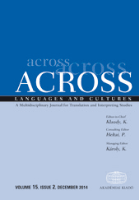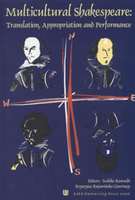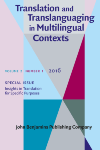
Estudios de Traduccion
Scope & Guideline
Unlocking knowledge in translation for all.
Introduction
Aims and Scopes
- Historical and Cultural Contexts of Translation:
The journal emphasizes the historical evolution and cultural significance of translation, examining how translation practices have shaped and been shaped by socio-political and cultural contexts. - Interdisciplinary Approaches to Translation:
Estudios de Traduccion promotes interdisciplinary research, incorporating insights from linguistics, literature, cultural studies, and communication to enrich the understanding of translation phenomena. - Translation Methodologies and Technologies:
The journal explores various methodologies and technologies employed in translation, including audiovisual translation, interpreting practices, and the impact of digital tools on translation processes. - Translation and Identity:
A key focus area is the relationship between translation and identity, analyzing how translation influences and reflects cultural identities, particularly in contexts of migration and cultural exchange. - Specialized Translation Studies:
The journal addresses specialized fields of translation, such as legal, medical, and technical translation, highlighting the specific challenges and practices within these domains.
Trending and Emerging
- Audiovisual Translation and New Media:
There is an increasing focus on audiovisual translation, particularly in the context of streaming media and digital platforms, addressing the unique challenges and strategies involved. - Translation and Cultural Transfer:
Emerging research highlights the complex processes of cultural transfer in translation, examining how translations mediate cultural understanding and exchange. - Gender and Translation:
The intersection of gender studies and translation is gaining prominence, exploring how gender influences translation practices and representation in texts. - Technological Integration in Translation:
Recent publications are exploring the role of technology in translation, including the use of AI and machine translation, and their implications for professional practices. - Ethics and Translation Practices:
A growing interest in the ethical dimensions of translation, including issues of fidelity, representation, and the translator's agency, is becoming a key theme in recent research.
Declining or Waning
- Traditional Literary Translation:
There has been a noticeable decrease in papers focused solely on traditional literary translation, possibly as the field shifts towards more interdisciplinary and applied studies. - Translation of Classic Texts:
The exploration of translations of classic texts, while still relevant, seems to be less prominent, as contemporary and modern translation issues gain more attention. - Focus on Static Translation Models:
There appears to be a waning interest in static models of translation, with a shift towards dynamic and adaptive frameworks that consider the evolving nature of language and culture. - Censorship in Historical Contexts:
Although censorship remains a significant topic, the specific focus on historical censorship practices in translation has seen a decline, as contemporary issues take precedence. - Translation in Non-Western Contexts:
Research specifically addressing translation practices in non-Western contexts is less frequently published, indicating a potential gap in the journal's scope.
Similar Journals

Across Languages and Cultures
Advancing Insights in Multilingual DynamicsAcross Languages and Cultures is a leading journal in the field of Linguistics and Language, published by AKADEMIAI KIADO ZRT in Hungary. With its ISSN 1585-1923 and E-ISSN 1588-2519, the journal has established itself as a prominent platform for advancing research and discussion in the dynamics of language across diverse cultural contexts. Its impressive Q1 category ranking indicates its significant influence, with a Scopus rank of #227 in Language and Linguistics, showcasing its robust academic impact (79th percentile). This journal, converging from 2007 to 2024, aims to foster interdisciplinary dialogue and promote innovative research methodologies in multilingual studies. Though not an open-access journal, Across Languages and Cultures provides invaluable insights for researchers, professionals, and students eager to explore the intricacies of language use and its sociocultural implications. Located at Budafoki Ut 187-189-A-3, H-1117 Budapest, Hungary, it continues to serve as an essential resource for those passionate about the linguistic sciences.

Linguistica Antverpiensia New Series-Themes in Translation Studies
Exploring the Nexus of Language and TranslationLinguistica Antverpiensia New Series-Themes in Translation Studies is a premier academic journal dedicated to advancing the field of translation studies through innovative research and critical analysis. Published by ACADEMIC & SCIENTIFIC PUBLISHERS-ASP in Belgium, this journal features a diverse range of scholarly articles that explore the complex interplay between linguistics and translation, making it an essential resource for researchers, professionals, and students alike. With a noteworthy Q1 ranking in the categories of Linguistics and Language, it is positioned within the top 25% of journals in its field according to the latest 2023 Scopus rankings. The journal fosters an open dialogue on current themes and methodological advancements in translation, which contributes significantly to the academic discourse globally. Through its commitment to high-quality, peer-reviewed content, Linguistica Antverpiensia aims to cultivate a deeper understanding of language dynamics and their role in effective translation practices, ensuring its relevance in a rapidly evolving linguistic landscape.

Perspectives-Studies in Translation Theory and Practice
Cultivating a Rich Dialogue on Translation PracticesPerspectives-Studies in Translation Theory and Practice, a leading journal published by Routledge Journals, Taylor & Francis Ltd, serves as a pivotal platform for the exploration of translation studies, fostering dialogue among researchers, professionals, and students in the fields of cultural studies, linguistics, and literature. Established in 1996, this esteemed journal has consistently maintained its position within the Q1 quartile in both cultural studies and linguistics, thanks to its rigorous peer-review process and dedication to high-quality scholarship. With an impressive ranking of 6th out of 1106 in Arts and Humanities Literature and Literary Theory on Scopus, Perspectives stands out as a vital resource for those seeking to enrich their understanding and engage with evolving translation theories and practices. The journal is not open access, yet it remains influential in shaping discourse and advancing knowledge within its dynamic and interdisciplinary field. Researchers and students alike will find valuable insights in its contributions, making it an essential addition to any academic library.

Panacea-Boletin de Medicina y Traduccion
Fostering Collaboration between Linguistics and Medical SciencesPanacea-Boletin de Medicina y Traduccion, published by TREMEDICA, serves as a valuable academic resource within the field of linguistics and language translation. With an ISSN of 1537-1964 and coverage from 2012 to 2023, this journal has established itself with an impressive Q2 ranking in the 2023 category of Linguistics and Language, indicating its significant contribution to the scholarly dialogue in this domain. The journal's rankings within Scopus, including the 41st percentile in Arts and Humanities and the 38th in Social Sciences, highlight its recognition and relevance among peers. Although it operates under a traditional access model, the journal remains committed to disseminating high-quality research that bridges the gap between medicine and linguistic translation, thereby enhancing interdisciplinary understanding and collaboration. For researchers, professionals, and students alike, Panacea-Boletin de Medicina y Traduccion stands as an essential publication for exploring emerging trends and fostering innovation in linguistic practices.

Tradumatica-Traduccio i Tecnologies de la Informacio i la Comunicacio
Catalyzing Innovations in Translation MethodologiesTradumatica-Traduccio i Tecnologies de la Informacio i la Comunicacio, published by the Universitat Autònoma de Barcelona, is a prestigious open-access journal that has established itself as a leading platform in the fields of Linguistics, Literature, and Communication Technologies since its inception in 2010. With its recent classification in the Q1 category of both Linguistics and Literary Theory, and an impressive 97th percentile ranking in Literature and Literary Theory on Scopus, this journal is recognized for its contribution to high-quality scholarly research. The journal serves as a vital resource for researchers, professionals, and students who are engaged in the dynamic intersection of translation studies and technology. Music its comprehensive coverage from 2019 to 2023, it aims to foster dialogues and advancements in translation methodologies and practices, making it indispensable for those looking to remain at the forefront of innovations in the field. Located in vibrant Barcelona, Spain, the journal provides an invaluable avenue for disseminating influential research while promoting an international scholarly community.

Multicultural Shakespeare-Translation Appropriation and Performance
Celebrating the Fusion of Cultures in Shakespearean PerformanceMulticultural Shakespeare: Translation, Appropriation and Performance is an esteemed open-access journal published by LODZ UNIV PRESS since 2011, dedicated to advancing scholarship in the fields of cultural studies, linguistics, and the performing arts. With an ISSN of 2083-8530 and an E-ISSN of 2300-7605, this journal plays a pivotal role in exploring the intersections of Shakespearean texts within diverse cultural contexts, offering fresh interpretations and performances. Hailing from Poland, it has made a noticeable impact by emerging in notable quartiles, particularly achieving Q3 rankings in both Literature and Literary Theory as well as Visual Arts and Performing Arts in 2023. The journal caters to a global audience of researchers, professionals, and students committed to enriching their understanding of multicultural perspectives on Shakespeare, embracing the nuances of translation and its relevance in today's multifaceted world. By providing an accessible platform for rigorous scholarship, this journal not only encourages academic discourse but also inspires innovative interpretations and performances that reflect our multicultural society.

Quaderns-Revista de Traduccio
Cultivating Knowledge in the Heart of BarcelonaQuaderns-Revista de Traduccio, published by the Universitat Autònoma de Barcelona, is a prominent journal in the field of Linguistics and Language, which has garnered recognition for its scholarly contributions since its inception. With an ISSN of 1138-5790 and an E-ISSN of 2014-9735, this journal has maintained an active publication schedule across notable cycles, contributing valuable insights from 2011 to 2018 and continuing from 2020 to 2024. As a Q3 category journal in both Arts and Humanities and Social Sciences related to Language and Linguistics, it occupies an important niche, ranking #607 out of 1088 and #692 out of 1167 respectively. Though currently not an open-access journal, its rigorous peer-review process ensures that published articles meet high academic standards, making them relevant for researchers, professionals, and students alike. Housed in Cerdanyola del Vallès, Barcelona, this journal serves as a critical platform for the dissemination of cutting-edge translation studies and linguistics research.

Translation and Translanguaging in Multilingual Contexts
Transforming Understanding in Multilingual CommunicationTranslation and Translanguaging in Multilingual Contexts, published by John Benjamins Publishing Co, is an esteemed academic journal that delves into the intricate relationships between translation practices and translanguaging in diverse linguistic settings. With its ISSN 2352-1805 and E-ISSN 2352-1813, this journal provides a platform for innovative research from 2019 to 2024, focusing on areas that intersect education, linguistics, and literary theory. Notably, it holds prestigious rankings, reflecting its impact and quality; it is classified in Q2 in Education, and Q1 in both Linguistics and Language, and Literature and Literary Theory for 2023. With Scopus rankings that place it in the top deciles of multiple categories, it serves as a vital resource for scholars aiming to explore multilingual communication's challenges and opportunities. Although it operates on a traditional access model, the journal remains a critical reference point for the exchange of ideas that shapes current research in these dynamic fields.

LFE-Revista de Lenguas para Fines Especificos
Catalyzing Dialogue in Language Studies WorldwideLFE-Revista de Lenguas para Fines Especificos is a distinguished academic journal focused on the field of applied linguistics and language education, published by UNIV LAS PALMAS GRAN CANARIA, SERV PUBL & DIF CIENT PARQUE CIENT. Established in 1993, this Open Access journal promotes the dissemination of research on specific purposes in language studies, making it an invaluable resource for researchers, educators, and students alike. Based in Spain, it serves an international audience interested in the intersection of language acquisition, pedagogy, and professional communication. Despite its recent entry into Scopus with competitive rankings in Social Sciences, particularly in Linguistics and Language and Education, the journal aims to continually enhance its impact by inviting innovative contributions that explore contemporary challenges and methodologies in language teaching and learning. Researchers are encouraged to tap into this growing repository of knowledge, which is easily accessible to foster collaborative and interdisciplinary dialogues within the field.

Cadernos de Traducao
Connecting researchers through rigorous peer-reviewed studies.Cadernos de Tradução, published by the Universidade Federal de Santa Catarina, is an esteemed open-access journal dedicated to fostering scholarship in the fields of Language, Linguistics, and Literature. Since its inception in 1996, this journal has emerged as a vital platform for research, particularly known for its rigorous peer-review process and commitment to academic excellence. With a Q2 ranking in Linguistics and Language and a Q1 ranking in Literature and Literary Theory as of 2023, it stands out in the global academic landscape, holding significant positions in Scopus rankings across various categories. Researchers, professionals, and students will find a wealth of interdisciplinary studies that contribute to current discussions and advancements in translation theory and practice. The journal's open-access model enhances visibility, ensuring that groundbreaking research is accessible to a wide audience, thus promoting dialogue and collaboration within the international academic community.